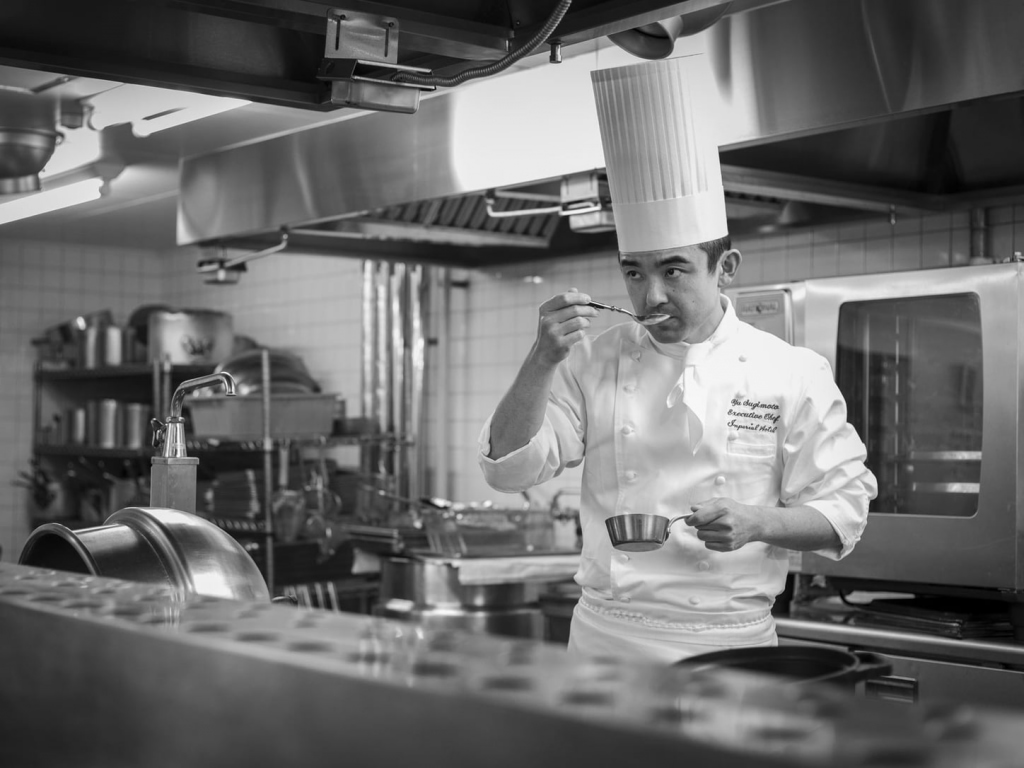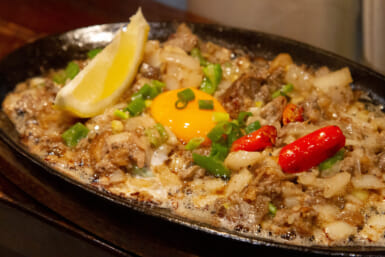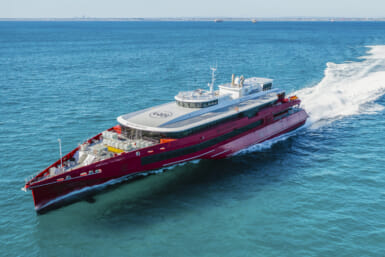Yu Sugimoto was only 38 when he took on the position of executive chef at the illustrious Imperial Hotel, Tokyo last year. Lauded for his perfect execution of French cuisine across Europe and with over a decade of experience working in France under Michelin-star chefs Yannick Alléno and Alain Ducasse, it’s no surprise this rising talent has reached such heights at a relatively young age.
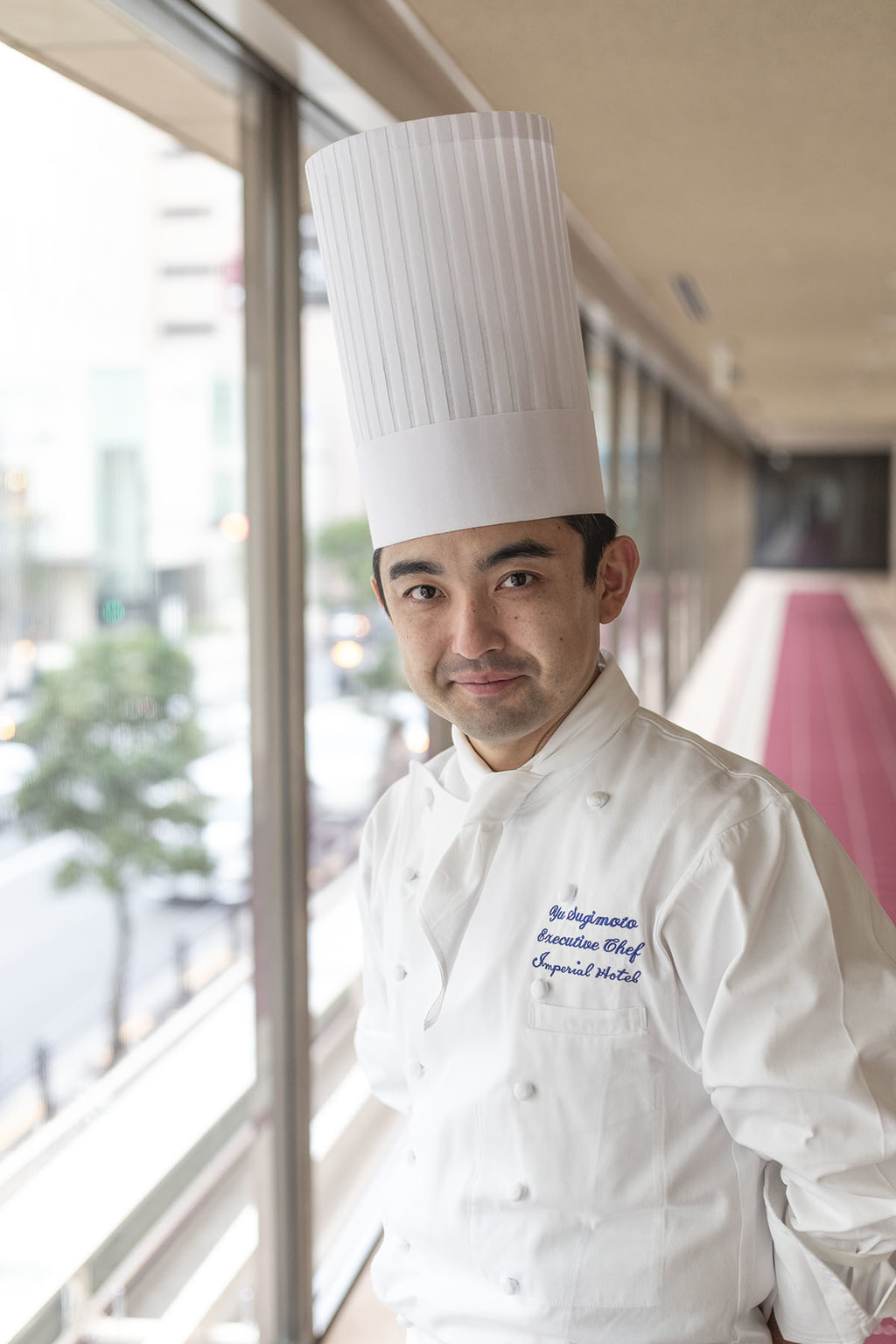
However, a career as a top chef wasn’t always a clear-cut choice for Sugimoto despite having parents with backgrounds in the hospitality industry. “Originally, I wanted to become a schoolteacher – either in home economics or social studies,” he reveals.
“I feel that even when cooking you’re teaching people something”
When asked why he eventually chose to work as a chef, he has a simple answer: “I realized I was pretty good at cooking.” Explaining the appeal of a career as a chef, he continues, “I feel that even when cooking you’re teaching people something. I can express things and pass on what I’ve learned to others. There is a lot of communication back and forth and I think it’s quite similar to teaching.”
It was a decision that would set Sugimoto on a career path halfway across the world, immersing him in French cuisine on many levels. “I studied not only French food, but cooking techniques and even history. I feel a responsibility to pass that aspect of culture on to younger people. It’s not just me. I think it’s an important role for Japanese chefs regardless of the cuisine they specialize in. There will be chefs of French cuisine in the future – and there are even now – who have learned their trade from Japanese nationals. So if I teach someone, it will impact French cuisine. I think that’s important and will become more so in the future.”
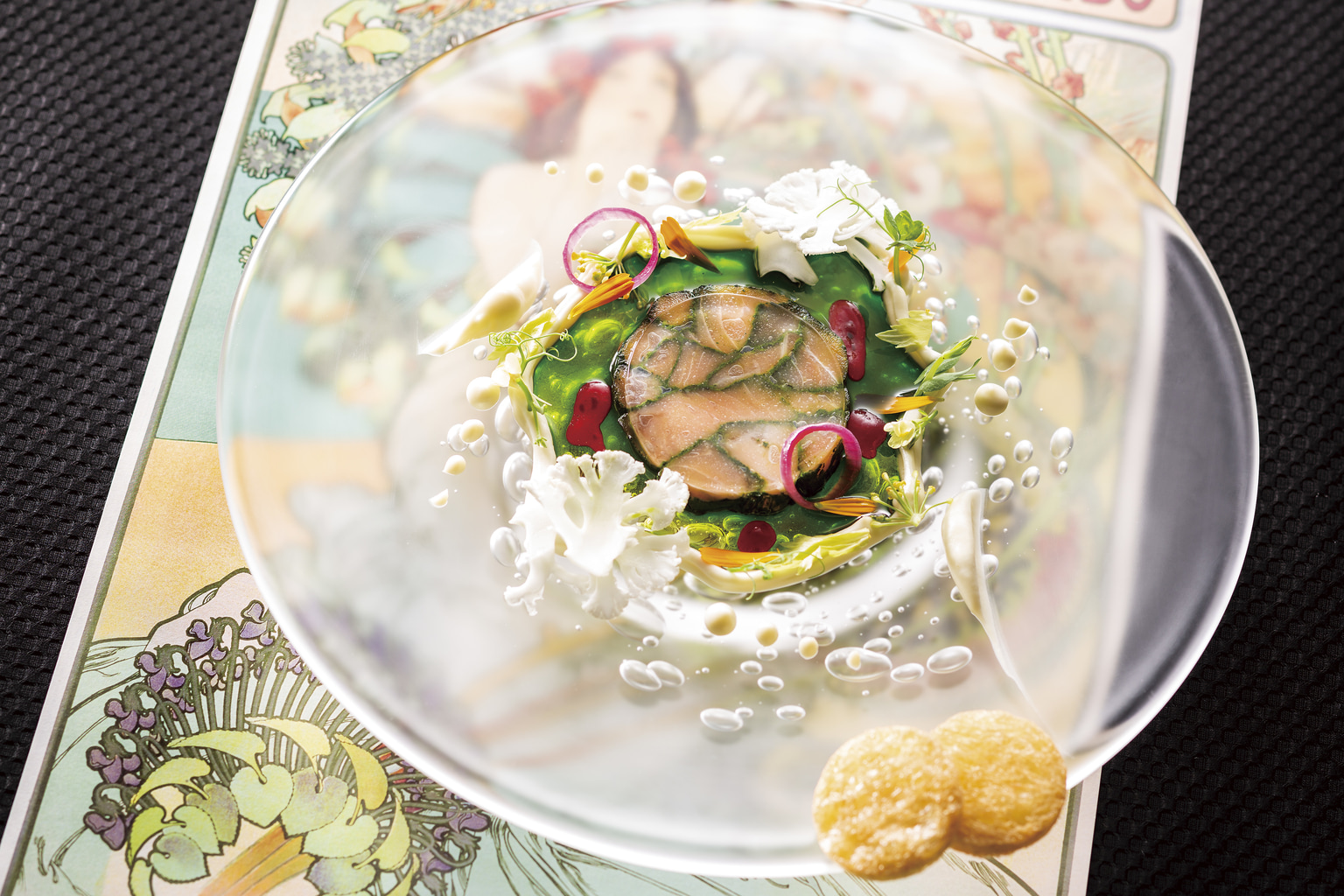
Salmon with herbs and wine jelly appetizer
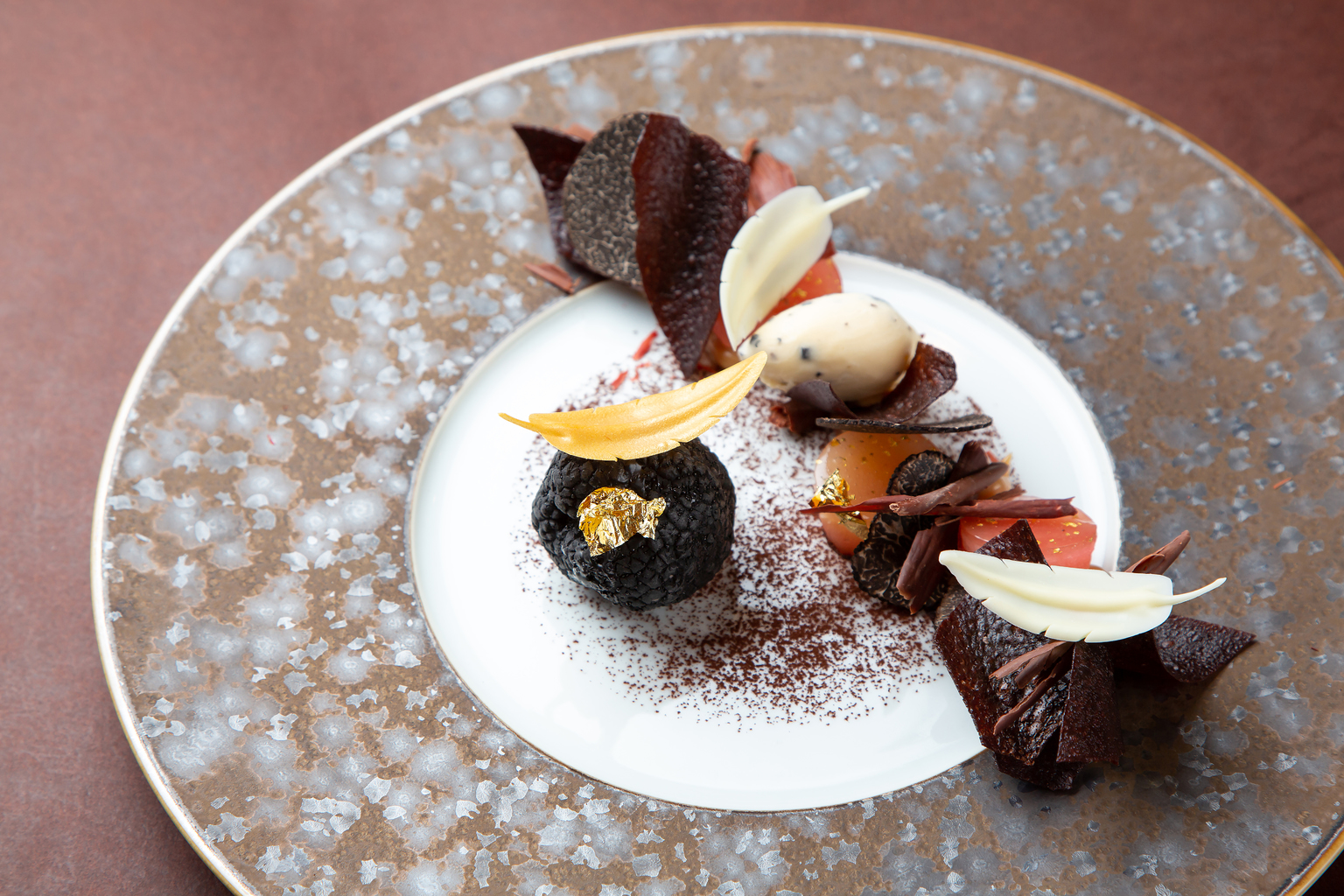
Black truffle and milk chocolate cream dessert
But before he took on roles at Brittany’s two-Michelin-starred Hotel de Carantec and Paris’s three-Michelin-starred main dining restaurant at the Hotel Le Meurice, he had a humble start as a waiter at the Imperial Hotel, Tokyo. “My father interned at the Imperial Hotel when he was young so I grew up hearing how well recognized it was. I was influenced by my home surroundings,” says Sugimoto.
He applied for a job as kitchen staff in 1999, but there were no openings at the time. Undeterred, he took on a job as a waiter until there was an available position as a chef. Once in the kitchen, Sugimoto decided that to fully realize his potential he would need to train in France. After receiving blessing from the former executive chef (now executive culinary advisor) Kenichiro Tanaka, he headed to France to pursue his dream. There, he excelled in his craft and even after 12 years in France – 13 years in Europe in total – he wasn’t necessarily ready to come back to Japan. “I still had a lot of things I wanted to do. If I hadn’t received an offer from the Imperial Hotel I would have stayed. Several other hotels tried to recruit me, but I wasn’t interested. For me, it was the Imperial Hotel or nothing.”
Now almost a year into his new position, he is in charge of over 350 members of culinary staff in one of Japan’s most famous hotels. When asked how he manages such a large group of people, he replies, “Communication is key. I have to share my way of thinking with regards to the food and the hotel’s brand. As this is creative work there is an element of sharing and joint ownership. Like playing catch, communication is a two-way street. At the same time, I have to consider the overall idea, as I’m not managing just one restaurant. For events, I work with specific restaurants and that’s when most of the back-and-forth happens. But it’s fun. I’m enjoying taking the things I learned in Europe and connecting it to the hotel’s brand to create new things.”
“As an example, you can make sushi with a very small team. You prep most of the ingredients and then piece it together. French food takes time. The sauces take a long time and a lot of people need to be involved. Everyone needs to be a team player and I have to consider how to motivate people. That’s one of the things I learned in France.”
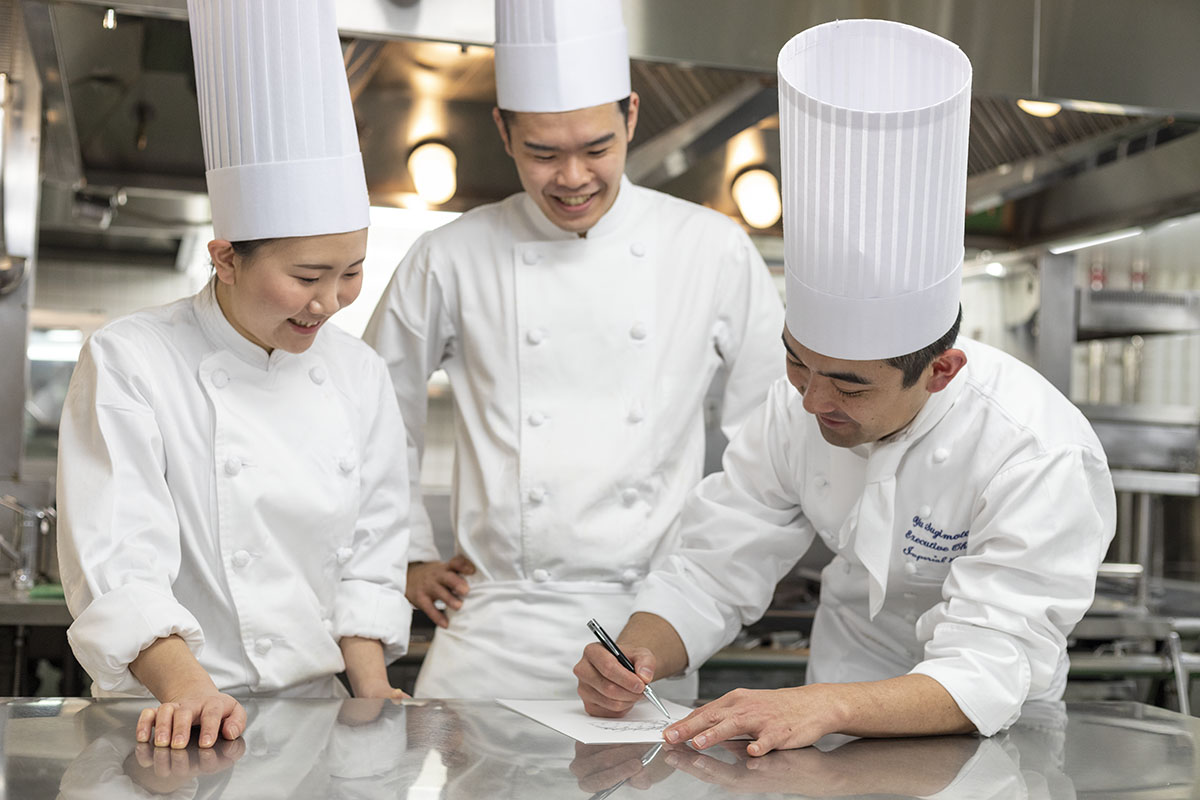
One thing that makes Sugimoto stand out is how unabashedly he expresses his love of cooking. While it may seem an obvious thing given his career choice, it goes deeper than just having a passion for the art of creating gastronomic masterpieces – it’s also a form of motivation.
“As a chef I think about how I can enjoy or love doing this more. I’m thinking that all the time”
Sugimoto explains, “I don’t like the idea that you have to persevere or do your best. I’ve never really thought that I need to do that. For me personally, I chose this role. As a chef I think about how I can enjoy or love doing this more. I’m thinking that all the time. Being a chef – no matter what role I have – won’t change, so I think about how to continue on this path and how to enjoy it. I don’t tell younger members of staff to work hard against all odds. Instead, I ask them to think about how to fall in love with food and the work they do. How can they make the guests enjoy their experience more? Thinking like that you can increase your own creativity and your own originality. Not everyone can become a head chef, but everyone can enjoy their job.”
When applying this philosophy to his own work, Sugimoto considers his motivation to be the guest eating his food. “I imagine what would keep them coming back, every day. I also consider if I were in their shoes. What would resound with me? Before dining here, a guest has to make a decision to come to this place. What will help them make that choice? It’s a matter of marketing as well as the food itself.”
Sugimoto’s style borrows from Alléno’s dynamic creativity and search for an element of surprise, as well as Ducasse’s management techniques. He wants people to experience that wow factor when they eat his food, but also makes sure to not stray too far from the food’s original essence. “I don’t want people to think ‘I don’t know what this is, but I like it.’ I don’t want to make food like that.”
Imperial Hotel, Tokyo
1-1-1 Uchisaiwai-cho, Chiyoda-ku
03-3504-1111
imperialhotel.co.jp/e/tokyo
///awards.glitter.workforce
Sponsored Post
Photographs by David Jaskiewicz

